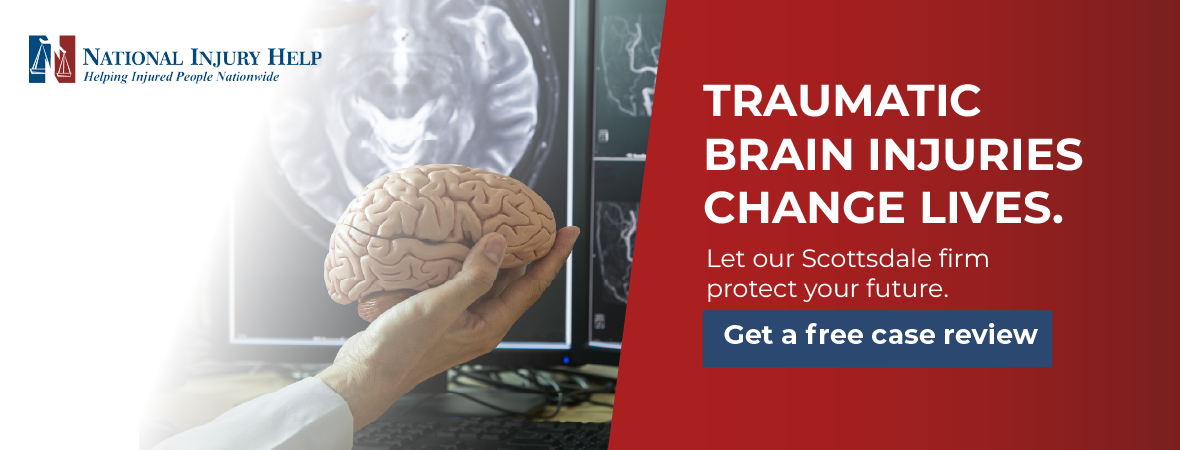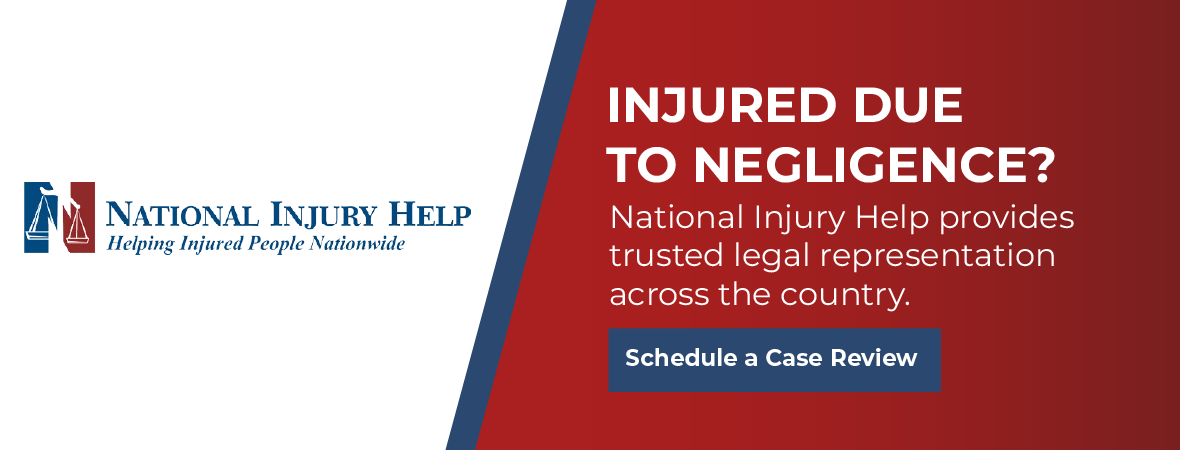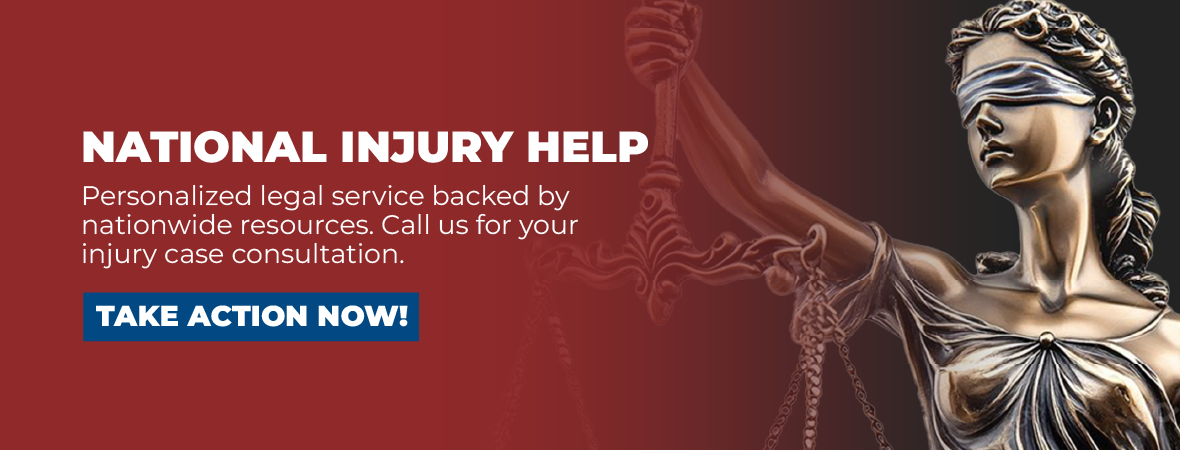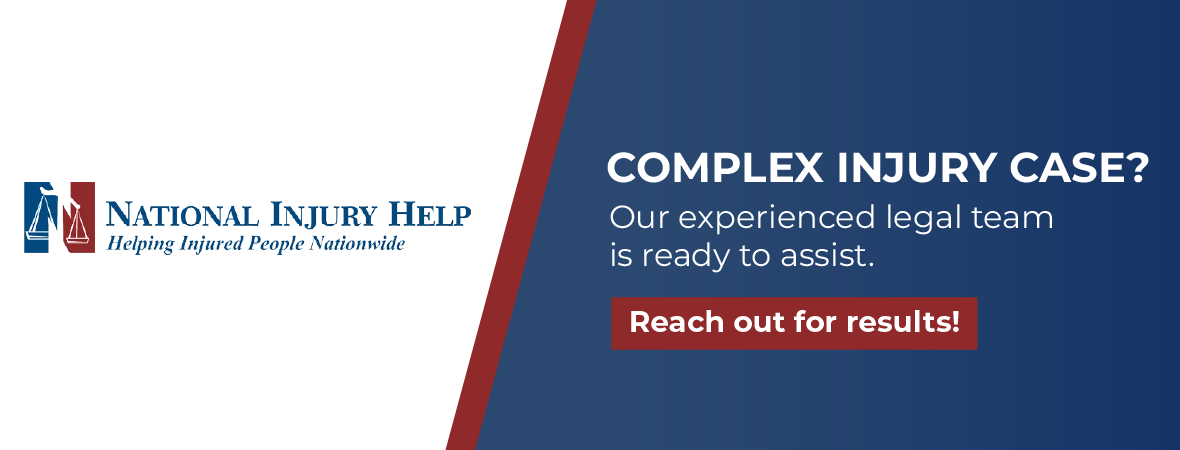Brain injuries can have lasting effects on your health, work, and daily life. Contact National Injury Help by calling us at 1 (800) 214-1010 today. We are here to support your recovery and fight for the justice you deserve.
You are probably reading this because you or someone you love suffered a head injury in Scottsdale. We know how frightening that feels. One moment, life seems normal; the next, a single blow turns every plan upside down. A brain injury, also called a traumatic brain injury or TBI, happens when a sudden force harms the brain. That force can be a car crash, a fall, or even a violent act. The effects can linger for months, years, or a lifetime. They reach into emotions, memory, movement, and money.
We also know that local help matters. A Scottsdale attorney understands the streets around Old Town, the busy Loop 101, and the rules inside the Maricopa County courts. When you hire National Injury Help, you gain neighbors who know the system and care about your future.
What is a Brain Injury?
A traumatic brain injury, often called a TBI, happens when something from the outside harms the brain. This is not the same as a stroke or a tumor. A TBI is usually caused by a sudden event like a car crash, a fall, a sports injury, or a violent attack.
Doctors divide brain injuries into two main groups:
- Traumatic brain injuries come from physical forces. These forces might be a bump, blow, jolt, or an object that goes into the brain, such as a bullet or piece of metal.
- Non-traumatic brain injuries are caused by things like lack of oxygen, infections, tumors, or exposure to toxins. These injuries may happen during medical emergencies like heart attacks or near-drownings.
Doctors also talk about open and closed brain injuries:
- An open brain injury means the skull has been broken or opened, often by an object that enters the brain.
- A closed brain injury means the skull stayed whole, but the brain moved or was shaken hard inside. This can still cause serious damage.
Even if the head looks fine on the outside, the brain may still be bruised, swollen, or bleeding inside. That is why brain injuries are sometimes called “invisible injuries.” You may not be able to see them, but they can change everything.
Scottsdale Brain Injury Attorney Explains Common Types of Brain Injuries
There are many types of brain injuries, and each one affects people in different ways. Here are five of the most common types you might hear about:
- Concussion
A concussion is often called a mild traumatic brain injury. It happens when the brain shakes inside the skull, usually after a hit to the head or a sudden stop, like in a car crash. Symptoms may include headaches, dizziness, trouble concentrating, or feeling confused.
Many people recover with rest, but some have symptoms that last for months or longer. Repeated concussions, like those often seen in sports, can lead to long-term brain problems.
- Contusion
A contusion is a bruise on the brain. It often comes with bleeding and swelling. Contusions happen when the brain strikes the inside of the skull during impact.
Some contusions are small and heal on their own, but others are large and require surgery to relieve pressure inside the skull. These injuries can cause problems with movement, speech, and memory.
- Diffuse Axonal Injury
A diffuse axonal injury happens when the brain rotates or twists inside the skull. This movement can stretch or tear the long nerve fibers that help different parts of the brain talk to each other.
This kind of injury is common in high-speed car crashes. It can lead to unconsciousness, coma, or long-term disability. Many people with this injury need long hospital stays and long-term care.
- Penetrating Brain Injury
A penetrating injury is exactly what it sounds like. It happens when something breaks through the skull and enters the brain. This might be a bullet, a knife, or shrapnel from an explosion.
Penetrating injuries can cause massive bleeding, damage to important brain areas, and infection. Emergency surgery is often needed right away. The recovery process can take years and may involve major changes in a person’s abilities and personality.
- Anoxic or Hypoxic Brain Injury
An anoxic brain injury happens when the brain is completely cut off from oxygen. A hypoxic brain injury happens when there is only a partial loss of oxygen. The brain needs oxygen every second to survive. When oxygen is lost, brain cells start to die within minutes.
These injuries may happen during heart attacks, strokes, near-drowning, or if someone stops breathing for too long. The longer the brain goes without oxygen, the more serious the damage.
Brain Injury Classifications: Mild, Moderate, or Severe
Doctors classify brain injuries by how serious they are. This helps guide treatment and legal claims. The three main levels are:
Mild TBI: Mild TBIs are often called concussions. A person may stay awake or lose consciousness for just a few seconds or minutes. Symptoms may include nausea, dizziness, headaches, and problems with focus or memory. Even though it is called “mild,” a mild TBI can still cause long-term problems in some people, especially if they have had more than one.
Moderate TBI: A moderate brain injury usually means the person lost consciousness for a longer time, perhaps 30 minutes to a few hours. The person may have clear signs of confusion or trouble with speech, movement, or coordination. CT scans or MRIs often show bleeding or swelling in the brain. Recovery takes longer, and some symptoms may never fully go away.
Severe TBI: A severe brain injury often involves long periods of unconsciousness or coma. The person may be unable to speak, move, or respond to their surroundings. Severe TBIs often require months or years of therapy and may result in permanent disability. The person may need a wheelchair, full-time care, and help with basic tasks like eating or bathing.
It is important to understand that even two people with the same kind of injury may recover very differently. Age, health, the location of the injury, and how fast treatment began all play a role in recovery.
Common Causes of Brain Injuries According to a Scottsdale Brain Injury Attorney
You might wonder how these injuries happen around our city. We see five main causes.
Car and Motorcycle Accidents
Scottsdale’s traffic can turn dangerous on Loop 101, Shea Boulevard, and Scottsdale Road. Rear-end crashes, T-bone hits, and motorcycle wipeouts all send shock waves through the skull. A sudden stop can slam the brain against the skull even when no outside object hits the head.
Slip and Fall Accidents
Loose handrails, dim stairwells, and wet floors make hidden traps. We see falls at restaurants, malls, and apartment complexes. A fall seems simple, yet a hard crack of the head on tile can cause bleeding inside the brain.
Bicycle and Pedestrian Accidents
Scottsdale is known for its bike-friendly design, but around Old Town and the Greenbelt paths, cars, scooters, and bikes mix in tight lanes. Distracted drivers miss crosswalk lights and hit riders who have no metal frame to protect them.
Construction and Workplace Accidents
Working on scaffolds, roofs, or tall ladders puts the brain at risk. Falling tools or beams can strike the head. Safety rules reduce danger, but shortcuts still cause trouble.
Assaults and Acts of Violence
Fights, domestic abuse, or blunt-force attacks can fracture a skull. These injuries carry emotional scars along with physical damage.
Symptoms and Effects of Brain Injuries
Brain injuries seldom look the same in two people, yet patterns help you spot trouble.
Physical Symptoms
You may feel headaches, dizziness, nausea, or fatigue. Coordination loss can change how you walk or hold objects.
Cognitive Symptoms
Memory gaps, confusion, or slow thinking can make simple tasks hard. You might forget appointments or lose track of conversations.
Emotional and Behavioral Changes
Mood swings, anxiety, or anger that were never there before can appear. Loved ones often notice these changes first.
Long-Term Consequences
Some victims cannot work, finish school, or drive. They may need daily care. Hobbies lose joy. Friendships stretch thin. The ripple spreads through the whole family.
Scottsdale Brain Injury Attorney Explains Legal Framework for Brain Injury Cases in Arizona
Arizona Personal Injury Law Basics
To win money in court, we must prove four points: duty, breach, causation, and damages. In plain words, someone had a duty to act safely, failed that duty, caused your injury, and that injury led to losses.
Statute of Limitations
Most Arizona injury cases must be filed within two years from the date of injury. Delayed symptoms or injuries to children can extend the limit, yet waiting is risky.
Comparative Fault in Arizona
You can still recover money if you share the blame. If you were 20 percent at fault, you still gain 80 percent of your damages. We work to keep your share low.
Claims Against Public Entities
If a city bus or a broken city sidewalk caused your injury, you must file a formal notice within 180 days and sue within one year. Deadlines move fast.
Scottsdale Brain Injury Attorney’s Guide for What to Do After a Brain Injury in Scottsdale
Step 1: Get Immediate Medical Care
Early scans and notes link the injury to the incident. ERs like HonorHealth Medical Center have the tools to check swelling and bleeding.
Step 2: Document the Incident
Take photos, gather witness names, save every medical bill, keep police reports, and file all letters from insurers. Evidence fades, yet paperwork stays strong.
Step 3: Avoid These Mistakes
Do not speak too soon with insurance adjusters. Do not downplay symptoms or skip follow-ups. Do not post details on social media. All can weaken your traumatic brain injury claim in Scottsdale.
Step 4: Contact a Scottsdale Brain Injury Attorney ASAP
Evidence slips away, and deadlines close doors. A prompt call lets us freeze-proof in place and guide treatment records.
How Our Team of Scottsdale Brain Injury Attorney Can Help
Conducting a Free Case Evaluation
We listen to your story, study medical charts, and review witness statements. We explain options in words that make sense.
Investigating the Cause and Building Evidence
We hire accident reconstruction experts, research maintenance logs, search for surveillance video, and consult with neurologists. A solid case rises from strong facts.
Dealing with Insurance Companies
Insurers often downplay brain injuries because symptoms can be invisible. We shield you from low offers and handle every call.
Calculating and Pursuing Maximum Compensation
We project lifetime care costs, lost earnings, and family impacts. Then we fight for full payment in talks or a trial.
Advantages of Hiring a Local Scottsdale Lawyer
We know local judges, mediators, and city safety codes. Face-to-face meetings are easy. We show up at rehab centers or homes when travel is hard.
Compensation Our Team of Scottsdale Brain Injury Attorneys Can Secure for Brain Injury Victims in Arizona
Economic Damages
You can claim emergency-room fees, hospital stays, therapy, medication, lost wages, and lost future income.
Non-Economic Damages
Pain, suffering, loss of joy, and emotional distress carry weight in Arizona courts.
When Punitive Damages May Apply
If a drunk driver or an intentional attack caused your injury, the court may punish that behavior with extra damages.
Long-Term Challenges of Brain Injury Victims and Their Families
When someone suffers a traumatic brain injury (TBI), the damage often goes far beyond what doctors can see on a scan. The effects don’t end when the hospital stay is over or when the stitches come out. For many people, life after a brain injury feels like a completely different reality. It brings physical, emotional, and financial challenges that affect not just the person injured, but their entire family.
Understanding the long-term struggles faced by brain injury victims and their loved ones is important. It helps us see that healing is not just about medicine. It is also about support, stability, and securing the resources that make life manageable again.
Financial Strain After a Brain Injury
One of the first and most obvious challenges is financial pressure. Medical bills can pile up quickly. Even with health insurance, the out-of-pocket costs for surgery, imaging tests, rehabilitation, and medications are high. For many families, these bills arrive just as one or both income earners are forced to stop working, either because of the injury or to care for the injured person full time.
Long-term therapy is often necessary to help with walking, talking, or managing emotions. These sessions may last for months or years. On top of that, many brain injury survivors need changes to their homes.
Wheelchair ramps, widened doorways, hospital-style beds, grab bars in bathrooms, or stair lifts can cost thousands of dollars. Some families even need to move to a new home to accommodate the injured person’s needs.
Assistive devices such as walkers, communication aids, or special computers can be expensive, too. And they often need to be replaced or updated over time.
When the person with the brain injury is also the main breadwinner for the family, the financial stress can feel impossible. Lost wages, missed retirement contributions, and the end of job-related health benefits can leave families wondering how they’ll survive.
Emotional and Family Impact
A brain injury doesn’t just hurt the person who was injured; it affects everyone who loves and cares for them. Spouses, parents, siblings, and children often step into caregiving roles with little warning or training.
These new responsibilities can include helping with bathing, dressing, feeding, managing medications, and coordinating doctor visits. Many caregivers must reduce their work hours or quit their jobs completely.
The emotional strain is real. It is hard to watch someone you love struggle with confusion, frustration, or loss of abilities. Some brain injury survivors undergo personality changes. A once-gentle person may become irritable or angry. Someone who was full of energy may now seem withdrawn or depressed. This can be deeply painful for families.
Children may feel confused or scared by a parent’s change in behavior. Spouses may feel alone in the relationship. Parents who expected to raise an independent adult may now have to provide full-time care for years or even decades.
Caregivers often suffer from burnout. They may have trouble sleeping, feel overwhelmed, or experience feelings of grief, even though their loved one is still alive. These feelings are normal, but they are heavy. Without help, they can lead to depression, anxiety, or health problems of their own.
FAQs About Brain Injury Claims in Scottsdale
How do I know if my head injury qualifies for a legal claim?
If someone else’s negligence contributed to the injury and you have medical proof, you likely have a claim.
What if symptoms appeared weeks later?
Arizona law allows delayed discovery in some cases where the symptoms appeared weeks later. Call quickly so we can preserve rights.
Can I sue if I was partially at fault?
Yes, you can still sue even if you were partially at fault. Arizona’s comparative fault still lets you recover reduced damages.
How long will my case take to settle?
Simple cases resolve in months. Complex brain injuries can take a year or more, especially if we need to show long-term costs.
What if I cannot afford a lawyer right now?
At National Injury Help, our contingency fee means you pay nothing out of pocket. We only get paid if we win money for you.
Contact a Scottsdale Brain Injury Attorney Today
A brain injury can change everything, but getting the right help shouldn’t be complicated. At National Injury Help, we make your next step simple. Call us for a free consultation and learn what your legal options are without any pressure or upfront cost.
We proudly serve clients across Scottsdale, Mesa, Chandler, and all of Maricopa County. With our no-win, no-fee promise, you will never pay unless we recover compensation for you.
If you or someone you love is dealing with the aftermath of a brain injury, do not wait. Time matters when it comes to protecting your rights and preserving evidence. Call 1 (800) 214-1010 today. We are available day or night to listen, support, and start building a path toward the secure future you deserve.










